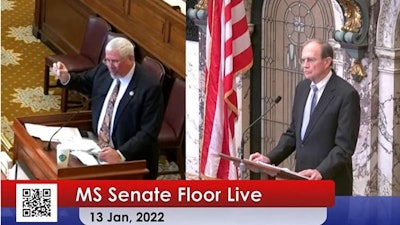
After Mississippi Gov. Tate Reeves played games with calling a special session last fall, the state Senate did not pussyfoot on passing medical cannabis legislation this week.
Making quick work on approving the Mississippi Medical Cannabis Act in committee, the upper chamber took up the legislation, Senate Bill 2095, on the Senate floor Jan. 13 and ultimately sent a stern message to the House and governor via a 46-5 vote for passage. The approval came just two days after the legislation was officially introduced for this session.
The bill, which Sen. Kevin Blackwell has been working to craft since early 2021, would allow registered patients in the state to access up to 3.5 grams of medical cannabis flower, 1 gram of concentrate or 100 milligrams of THC in an infused product per day—or roughly 3.7 ounces of flower per month.
The proposed possession limit created rift between the Legislature and Reeves, who requested reducing the limit by half before he’d call a special session last fall. But that was just one of several requests the governor made, Blackwell told Cannabis Business Times last week. Reeves originally made nine requests, seven of which the Legislature accommodated, but then he kept coming back with more, and more, demands, Blackwell said.
Blackwell and Rep. Lee Yancey—both Republicans—did not budge on the possession limit for the compromise bill they agreed upon last fall, and Reeves never called the special session. The legislative effort by Blackwell and Yancey was intended to accomplish the goals of November 2020’s voter-approved Initiative 65, which the state’s Supreme Court struck down on a signature-gathering technicality in May 2021.
RELATED: Mississippi Supreme Court Overturns Voter-Approved Ballot Initiative for Medical Cannabis
In a social media post from late December, Reeves claimed the 3.5-gram-per-day limit would allow individuals to “smoke 11 joints a day” every day, which he could not stand by, opening the door for a veto threat this legislative session.
Blackwell denounced that claim Thursday on the Senate floor, bringing a joint of hemp and other samples of low-THC products to the chamber, so he could try to convey a sense of scale to the rest of the body members.
“There’s been a lot of discussion in social media and on the radio about the amount of marijuana that we’re going to allow. Before everybody flips out, this is only hemp,” Blackwell said, and held up one of his samples. “This is three and a half grams of flower.”
Blackwell added, “There’s been other talk that this is 11 joints. ‘People are going to be getting 11 joints.’ No. I’m going to show you what a joint looks like, for those of you who don’t know. This will make about three and half joints a day.”
Blackwell also told CBT that he brought a 4-ounce sample of hemp to Reeves’ office when he met with the governor last week. While Blackwell said it was his impression that Reeves was appreciative of the direction S.B. 2095 was headed, the governor did not offer his blessing of the bill at the meeting.
Nonetheless, the Senate moved forward on passage with 90% approval from the body.
In addition to the possession limits, S.B. 2095 would impose a 5% excise tax on medical cannabis as well as the state’s 7% sales tax. The bill would also implement a seed-to-sale tracking system, allow local governments the freedom to opt out of allowing cultivation, processing, sale and/or distribution of medical cannabis in their municipalities, and offer an unlimited license structure for those who want to participate in the program.
Overall, seven amendments were proposed to the bill, but the only one that passed involved a miniscule language adjustment offered by Blackwell.
An amendment proposed by Democratic Sen. Barbara Blackmon aimed to allow for outdoor cultivation and harvesting, but Blackwell asked his colleagues to vote against the amendment because of what he said would be additional costs to supervise those operations. Blackmon’s proposal failed, 35-11.
Another amendment proposed by Democratic Sen. Derrick Simmons aimed at helping those with prior cannabis arrests or convictions gain complete societal reentry through an expedited expungement process for those who meet the medical conditions outlines in S.B. 2095.
“If you actually have a conviction, you have to wait five years after the completion of all the terms and conditions of that sentence before getting an expungement,” Simmons said. “Those Mississippians that would now have a [medical cannabis] card, they should no longer have to deal with something in their past for what is now legalized.”
While Blackwell said he agreed with the direction of Simmons’ proposal, he did not support it being attached to S.B. 2095 because of the ambiguity involved with someone who would qualify as a medical cannabis patient under the legislation then coming forward to self-diagnose his or her condition to the time of a past conviction. The amendment failed, 32-15.
Later in the floor session, Republican Sen. Angela Burks Hill proposed a strike-all amendment, providing her own alternative bill that she said offered a less-broad starting point for reform with the flexibility of further program expansions down the road as needed.
Blackwell said he was almost overwhelmed by that proposal and didn’t quite know how to respond.
“If you want to kill a medical cannabis program, I’d encourage you to vote for Sen. Hill’s amendment,” he said. “In May, we started having meetings about medical cannabis. I’ve been down here almost weekly since that time. … We’ve met with a whole host of agencies, groups—religious groups, advocacy groups, patient groups, law enforcement—to come up with the provisions that we have in Senate Bill 2095.
“It’s not going to be perfect. We’re trying to get it as close to perfect as we can. It will be one of the better bills throughout the nation when it’s passed. And we’ll have the opportunity every year to come back and tweak anything that we need to.”
Hill’s strike-all amendment failed, 40-6.
Blackwell went on and said there have been a number of references made that insinuate or compare S.B. 2095 to adult-use cannabis programs.
Even in Reeves’ late December social media post, the governor wrote, “Medicinal or Recreational marijuana? That is the question.”
But Blackwell offered a suggestion for those who think S.B. 2095 compares to an adult-use program: “maybe you should take the time and actually read the bill, because you’ll find that it is a medical bill.”
Earlier in the floor session, when Blackwell first took the microphone, he began by quoting some lyrics of “Rainy Day Women #12 & 35” from American songwriter Bob Dylan’s 1966 album.
Well, they’ll stone you when you’re trying to be so good
They’ll stone you just like they said they would …
They’ll stone you when you’re walking on the street
They’ll stone you when you’re tryin’ to keep your seat …
They’ll stone you when you’re tryin’ to make a buck
They’ll stone you and then they’ll say “good luck” …
They’ll stone you when you’re riding in your car
They’ll stone you when you’re playing your guitar …
But I would not feel so all alone
Everybody must get stoned.
“What’s the significance in these lyrics in relation to this bill?” Blackwell asked. “It’s basically to draw attention to the almost hysterical, paranoid reefer madness, chicken-little belief expressed by a few skeptics that if we pass a medical cannabis bill, the streets of Mississippi will be flooded by pot-smoking zombies, crime will explode, planes will fall from the sky and the world as we know it will simply come to an end.”
While some may share those “illogical” beliefs, Blackwell said, they are simply not true.
Mississippi’s medical cannabis reform effort is now in the House’s hands.


























